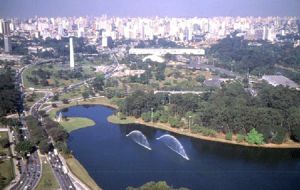MercoPress. South Atlantic News Agency
Sao Paulo protest against World Cup and demand more hospitals and schools
 Brazil's business city will host the inaugural match of the Cup
Brazil's business city will host the inaugural match of the Cup Brazilian police used tear gas and made an estimated 230 arrests on Saturday evening to disperse a protest in Sao Paulo ahead of the World Cup. Among those arrested in Brazil's business hub, which will host the opening match of the World Cup on June 12, were five journalists, O Estado de Sao Paulo daily reported.
Military police said via Twitter that four demonstrators and two police had been hurt in the protests, which began peacefully but degenerated after some protesters set barricades alight and smashed windows of banks. Police responded with tear gas.
The size of the protest was modest, rallying around 1,000 people, but some of those present were masked youths from the anarchist Black Bloc grouping.
Many Brazilians are angry at the billions of dollars being spent on the World Cup and also the 2016 Rio Olympics in a country where public facilities are poor and in need of massive investment. There is also growing disillusionment with the political establishment because of rampant corruption cases and with very few exceptions, impunity.
Some marchers carried banners bearing slogans such as “There will be no Cup” or “Cup for the rich, scraps for the poor.”
Some demonstrators accused the police of heavy-handedness, one insisting “not even a window had been broken when the police started attacking everybody.”
Recent protests have drawn far fewer people than those which marred last year's Confederations' Cup, but this year's marches have included a more radical element.
Brazil is spending some 11 billion dollars on the World Cup but many civilians say investment in health, education and transport should be far bigger priorities.
A February 6 protest in Rio ended tragically with the death of a television cameraman who died after being struck in the head by a flare.
Last year's demonstrations started off in Sao Paulo in response to transport fare hikes but quickly spread, drawing more than a million people into the streets with anger at World Cup spending an underlying theme.
Protests and massive demonstrations continued during the Confederation Cup played last June/July and extensive booing of FIFA Joseph Blatter and president Dilma Rousseff at several matches…
A further round of fare rises earlier this month fuelled fresh anger.
The government insists that the country will benefit overall from staging the World Cup and polls show that a majority of the population back the event




Top Comments
Disclaimer & comment rules-

-

-

Read all commentsThis is where it all starts!
Feb 24th, 2014 - 10:16 am 0I feel sorry for many lower income Brazilians who are asked to support & pay for W=Cup and Olympics when they are facing daily problems such as poor infrastructure,lack of sufficient number of medical facilities, poor housings, poor sanitary states (Copa Cabana is infested with untreated waste water including untreated feces, etc.). Brazil, being a third world country, wanted to show off their capability to hold some sporting events, but nowadays, they cost huge amounts of money, which should be spent to alleviate the above-mentioend problems. The money spent by Brazil is to enrich Fifa bureaucrats, construction companies, which are very corrupt. As to Olympics, it also enriches corrupt beureacrats, construction companies. Brazil is not a developed countries such as US, Russia, & Japan. Also it does not have money like China, Japan and Russia. Brazil has better industries than all other South American countries such as Argentina but due to the huge Amazon area, it has hand-full problems, although it is a big source for some ingredients for new medicines, but often stolen by the US and EU, which patent them. I do not know exactly what Rousseff is doing or trying to do, but she has to face huge corruptions, agricultural problems as it has huge GM (genetically modified) soybeans, etc., which are poisonous to human health. This is a big problem for Argentina.
Feb 24th, 2014 - 10:27 am 0@ 2
Feb 24th, 2014 - 10:42 am 0All Arenas belong to private initiative. So there is no public money at stake!
Commenting for this story is now closed.
If you have a Facebook account, become a fan and comment on our Facebook Page!